Tags
"reed winter externship"
St. Paul's and the Church of the Parables, Reed Winter Externship Program, Meredith Mathis
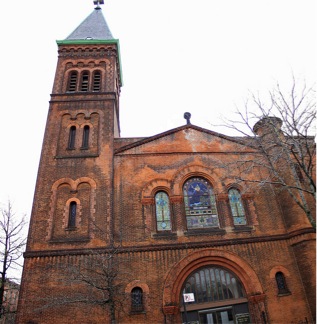
Meredith Mathis participated in a Reed Winter Externship, contributing to community services and support at St. Paul's and the Church of the Parables with Ben McKelahan.
The activities I did varied a good deal from day to day. One day I went to a clergy bible study and got a tour of a Senior Center at the St. James Matthew Emmanuel Lutheran Church, and went to a Mission Developer’s lunch (where pastors talked about their experiences and difficulties and offered each other support). Another day I met with a pastor and talked about the process of establishing a homeless respite bed program run by the Lutheran Church of the Messiah, met with the non-profit El Puente, and went to a church council meeting. I also got to sit in on meetings about planning future camp activities, walk around the neighborhood St. Paul’s is located in and check in with community members, go to the Metropolitan Museum of Art with a number of pastors and seminary students, work on an art project for an upcoming three kings celebration/community event, and attend Sunday service, a Three Kings party and parables.
One of the most engaging parts of this experience was discussing the respite bed program being developed (mentioned above). This respite bed program was intended to house homeless community members overnight in the church, but certain community members were against the program, and the church building had to be renovated before the city would let it run. A lot of what I got out of that experience is that bureaucracy and community disagreement will come up regardless of how good or necessary a program is. But for one, it’s good to realize that if I’m going to do community work of any kind, the city will always have jurisdiction over the physical spaces I’m trying to cultivate into community spaces or convert in times of crisis (this bed program was a response to crises of homeless individuals’ lives being put in danger because of the cold in New York), and there is no forcing a sense of urgency in other people even if their position on an issue is inflicting direct harm onto others. However, the conflicts that were being dealt with didn’t stop efforts to organize and make changes needed to get the program running eventually.
Continue reading St. Paul's and the Church of the Parables, Reed Winter Externship Program, Meredith Mathis
Reed Winter Externship Reflections 14: Number twenty-eight, The Union, Julia Selker

The unthinking college student might believe—having spent so much time in high school—that there is nothing more to learn there. Your intrepid author was not so quick to dismiss and got an inside look at the other side of the story.
It is early afternoon, and the overcast sky hangs heavily outside of the classroom window. A lone freshman stands with the whiteboard behind him, his slouching silhouette accentuated by the blinding glare of the projector. With an air of teenage detachment but the heart of a true citizen, he presents his research on Chris Christie’s scandal.
His classmates gravely weigh in on the controversy, their young minds heavy with the consequences of this political retaliation. The discussion is expertly guided by a figure that stands with a notepad at the back of the room.
This is Laura Paxson, bold and charismatic high school teacher. Her demeanor is stoic in the face of the tragedy that befell New Jersey bridge-crossers as their commutes were indefinitely delayed, but this is nothing compared to the questions that she will face when the bell tolls.
The students file out of the classroom jovially, excited to see their friends and family. Paxson’s work, however, is far from over. The transition is swift: one minute a history teacher, the next the president of the Lake Oswego teacher’s union.
There is no time to waste. Equipped with a heavy binder Paxson jumps in a sporty red car to hit the open road. Soothing but energetic tunes accompany her for the eight-minute journey to Oregon Education Association Headquarters. The Executive Board is gathering.
The Board is assembled in a conference room, munching pita chips as the anticipation builds. The small talk is engaging; these are not only colleagues but friends. Then, with authority and efficiency, Paxson calls the meeting to order. They look over the minutes from the last meeting and move to approve them. They quickly determine the state of the union’s budget, and then get down to business.
A teacher’s union has many projects, varying broadly in size and scope. Much of the meeting is spent discussing political action and how to mobilize the teachers to participate in lobbying activities that could improve the state of the education system. A ballot measure to decrease class sizes will need their support, for instance. They also plan to attend a convention for the improvement of education, where they will have conversations with politicians to gauge the candidates' dedication to the school system and influence their policy choices.
Suddenly the scope narrows: a single teacher was placed in an uncomfortable and difficult situation because the principal of the school did not prevent it. The tone in the room becomes grave as the executive board weighs their options for giving support to the teacher and making sure that the principal knows that such behavior is not acceptable. The teacher’s contract is referenced frequently, where their right to protection is stated clearly.
Another issue they faced was the possibility of a strike in Medford, because the local teachers’ contract is being violated. The Medford union asked for gestures of support, in the form of small quantities of money. This question will be brought up later in a larger meeting with representatives from all of the schools. There they will decide to send $100 to the Medford union as a symbol of solidarity.
The meeting draws to a close, but the President’s day is not yet done. Returning to the high school in her spicy red car, she presents the school board with a thank you card signed by the executive board of the union. It expresses their appreciation for the school board.
The differences between the school board meeting and the executive board meeting are stark. The school board discusses questions brought by community members, including the sheriff who wants a law that will allow him greater power in instances of underage drinking. The board discusses this seriously, but always with the winding tone of a philosophical question. The executive board, on the other hand, dealt with their many questions energetically, with one eye on the bureaucracy and the other on the people involved. The school board wondered at what they could do to abstractly “help the children” but the union’s executive board worked on actions that they could take to improve the individual well being of teachers, as well as the fate of the entire school system, with intense personal dedication.
Continue reading Reed Winter Externship Reflections 14: Number twenty-eight, The Union, Julia Selker
Reed Winter Externship Reflections 14: Number twenty-seven, Sewerage Agency of Southern Marin, Kathleya Strode

Sewage treatment isn’t exactly what we would call a ‘sexy science’, but it is a job for a true environmentalist. I learned this when I spent about a week shadowing chemist Liz Falejczyk at the Sewerage Agency of Southern Marin (SASM) in the north San Francisco Bay area.
I arrived on Sunday and drove with Liz to her home in Sonoma County, which is way north of Marin – as we drove, we passed the SASM building (which is just north of the Golden Gate Bridge) and a lot of gorgeous farmland. I took the opportunity of arriving on a non-working day to visit the Armstrong Redwoods State Natural Reserve and take a look at all of the gorgeous trees. I had never seen redwoods before, so it was a huge treat.
Monday morning we woke up early and arrived at the plant just in time to see the sun rise. I got a tour of the entire grounds, beginning where the sewage enters the plant in a room that is referred to as the headworks. Just as the sewage plant was built in the lowest area in the valley so that most of the pipes can flow with gravity, the headworks are underground in the lowest point of the plant. Sewage is then screened to remove plastic and other non-processable items and pumped through another room up to ground level.
Continue reading Reed Winter Externship Reflections 14: Number twenty-seven, Sewerage Agency of Southern Marin, Kathleya Strode
Reed Winter Externship Reflections 14: Number twenty-six, Thompson-Schill Lab, Phoebe Bauer

Despite having only a couple days to explore, this externship was productive and enjoyable. Sharon made sure to set up plenty of good things to make the best use of our time, so we bounced between people pretty quickly. We got to see a technique called transcranial direct current stimulation in action, with Ben as a participant. tDCS (see image) involves electrodes that pass a current intended to stimulate or impede neural firing through a certain section of a brain, therefore manipulating the behavioral outcome on an activity.
We also had the opportunity to talk individually with a number of Sharon’s graduate students and post-docs, hearing about their particular research projects in her lab as well as their career trajectories. This was incredibly useful, since we don't have access to people in those positions at Reed. Many of them encouraged us to take time off and see more of the world before entering grad school, because once on that path it will be a long time before we get another chance to do so. But having done their wandering they all seem quite happy to be where they are now, and I think their diversity of perspectives is one thing that makes her lab a good one.
Continue reading Reed Winter Externship Reflections 14: Number twenty-six, Thompson-Schill Lab, Phoebe Bauer
Reed Winter Externship Reflections 14: Number twenty-five, Saturday Academy, Jeremy Cosel
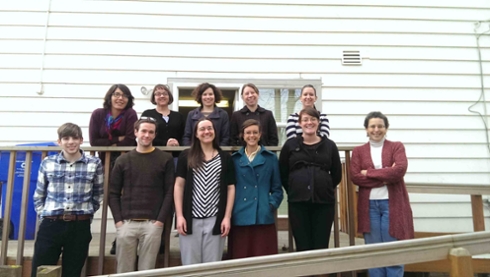
Over my winter break, I went to visit the Saturday Academy administrative office located on the University of Portland's campus, and it was quite fun! I met some outstanding individuals who work not just for a living, but in order to provide quality academic programs for kids all across Portland and the greater Oregon area. That's the benefit of being a non-profit: you do work that is relevant to your interests, but also participating in a group that makes quite a meaningful impact on the community. During my weeklong visit, I helped staff revise internship descriptions provided by several dozen major companies across Portland, a part of Saturday Academy's Apprenticeships in Science and Engineering (ASE) program. Thinking about how to best incorporate a diversity of high school students regardless of their gender or socioeconomic status is something I have never considered, and was a thoughtful challenge for me. With an interest in Technology and Education, I learned about all the hard work that goes into organizing the hundreds of educational opportunities Saturday Academy provides, and was proud to assist with tasks in the background in order to provide a great experience for the families signed up with Saturday Academy this year.
Continue reading Reed Winter Externship Reflections 14: Number twenty-five, Saturday Academy, Jeremy Cosel
Reed Winter Externship Reflections 14: Number twenty four, SASM, Ilana Novakoski
I enjoyed learning about the workings of a sewage treatment plant. When I arrived, I was given a tour of the facility. First I saw the wet wells, where the raw sewage initially enters the plant. From there, the water travels through deep tanks where the solid waste can settle out. The water then trickles through giant towers where bacteria, grown on honeycomb-shaped sheets of plastic, break down dissolved towers. Not all sewage plants operate with the exact same format; during my time with SASM, I toured four treatment plant facilities. The plant in San Francisco was partially under the zoo. It also had facilities to treat its own odor. Another treatment plant was stacked on top of itself so that it took up as little space as possible. I watched the lab technician sample the effluent and observed the different tests run on the effluent to make sure it was fit to release into the bay. I also learned about the problem of leaking pipes and how the administration decides whose job it is to fix the various sewer lines. Finally, I shadowed an inspector as she looked at the grease traps of restaurants and commercial kitchens.
Reed Winter Externship Reflections 14: Number Twenty three, Corey McPherson Nash, Sanjeev Verma
For my externship I worked with Michael McPherson '69, the creative director and co-founder of Corey McPherson Nash, a design and branding firm in Boston. Michael studied philosophy at Reed, but then received his MFA from the Rhode Island School of Design. He described this transformation romantically, musing that he stepped out of the Reed library one evening after completing his Yale PhD application, and saw before him a gleaming sunset envelop the campus. The sun set and he saw the light. Something struck him that day, and he immediately withdrew his application to Yale. He moved to a cooperative farm in Washington to ponder his next move. Here he refined his skills in calligraphy and increased his knowledge of typography. His zeal for design eventually led him to RISD, where he was a member of the first graduating class.
Since then, Michael has inscribed a culture of unwavering commitment to creativity and quality design at his firm, Corey McPherson Nash. The firm produces meticulously-crafted branding material and emphasizes a cooperative relationship with clients to determine their brand position. During my externship I was able to step into Michael's shoes for a few days, and gain exposure to video and graphic designers who were passionate about making great products. I saw their intensive creative process unfold first-hand and began to understand the necessity of making countless renderings and revisions; I appreciated their cooperative work environment; I laughed with them when they struggled to explain the difference between a vermillion and amber orange to clients. Overall, it was a fantastic experience.
In addition to the work experience, Michael's story and character left a very meaningful impression on me. He facilitated my interests, engaged me in his work, and inspired me to keep a diverse array of interests.
Continue reading Reed Winter Externship Reflections 14: Number Twenty three, Corey McPherson Nash, Sanjeev Verma
Reed Winter Externship Reflections 14: Number Twenty Two, Saturday Academy, Sam Underwood
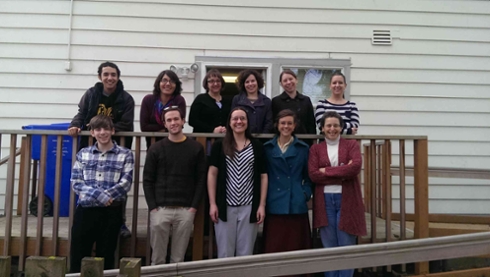
I participated in a weeklong externship with Saturday Academy, an educational non-profit established in 1983 and based in Portland. Saturday Academy’s mission is to provide supplemental learning opportunities to kids from second grade through high school. Saturday Academy organizes over five hundred classes a year, all taught by experts from the community. Saturday Academy states that their emphasis is on science, technology, engineering and math—but a quick peek at their website shows a vast array of classes in all fields, from writing to engineering to acting. This was information I knew as I headed to my externship on the first day. What I didn’t know was that the entire organization is run by just a handful of people. Just thirteen, to be exact. Over my week at Saturday Academy I observed an efficient, enthusiastic, and creative team working hard to providing learning opportunities to bright young students.
My first task as an extern involved Saturday Academy’s Apprenticeships in Science and Engineering (ASE) program. The ASE program matches up promising high school students with industry mentors. The students spend the summer in labs or in the field, working with their mentors. In January, the industry mentors had just submitted blurbs describing the work their high school-aged interns will be doing this coming summer. In addition to proof-reading these blurbs, I vetted their wording to make sure subtle gender bias wasn’t implicit in the language chosen by the writers. As it turns out, gender bias in job descriptions is a persisting issue and data indicate this wording-bias contributes to women being underrepresented in STEM fields. Saturday Academy is deeply dedicated to providing opportunity to all children, including those historically underrepresented in STEM.
Jeri Janowsky, Saturday Academy’s director, told me that a goal of Saturday Academy is to frame education as something that doesn’t have to end when the school day ends, but rather, to frame education as a dynamic, continuing experience throughout life. I strongly embrace this perspective, and Saturday Academy is embodying the idea that education can take place even after the last school bell rings. My time at Saturday Academy was encouraging and motivational—seeing an organization with such an important message flourishing gives me (otherwise absent) high hopes for the future of education in the U.S.
Continue reading Reed Winter Externship Reflections 14: Number Twenty Two, Saturday Academy, Sam Underwood
Reed Winter Externship Reflections 14: Number Twenty One, Robert Wood Johnson Foundation, Robert Haas
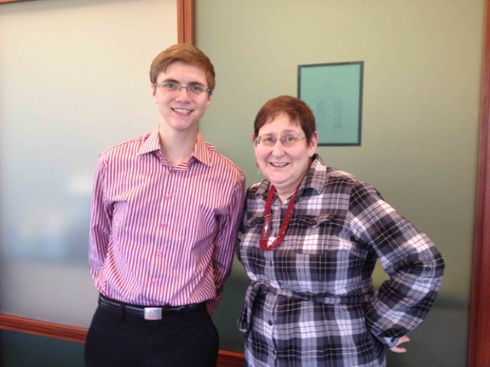
I did my first externship at the Robert Wood Johnson Foundation in Princeton NJ, and it was completely rewarding. My mentor, Laura, included me in all her day to day work as an evaluator for one of the largest philanthropic foundations in the world. I learned about the public health advocacy the Foundation does, and gained valuable insight into the health care system of the United States. This externship also showed me what its like to work in a busy office, with meetings and conferences and cubicles. More importantly though, it helped me expand my career interests and gave me valuable contacts in public health.
At the Foundation I helped do research for one of the grant evaluations that Laura was involved in, and also met with public health officials looking to get a grant from the Foundation. I even helped Laura, my mentor, with her chapter of a public health textbook for the new edition. All in all, this externship was great, I learned a lot about public health advocacy, and the externship has helped broaden my horizons in the job search field.
Continue reading Reed Winter Externship Reflections 14: Number Twenty One, Robert Wood Johnson Foundation, Robert Haas
Reed Winter Externship Reflections 14: Number Twenty, AppFog, Richard Adcock
"Marketing is something you do when people don't want to buy your product."
Part of a spirited lunch-hour debate, this quote from my sponsor (Richard Kotulski-Wakefield of AppFog) carries a lot of meaning. Hyperbolic, maybe, but the sentiment pervades many tech startups. If your idea is good enough, just give the beta of your product to the relevant bloggers and tech journalists, and it'll take off by itself. So the thinking goes. This somewhat romantic notion--software market as meritocracy, if you will--attracts the ambitious and the free-thinking in equal measure.
The successful are both.
Reed Winter Externship Reflections 14: Number Nineteen, Redden and Findling LLC, Luke Hackenberg
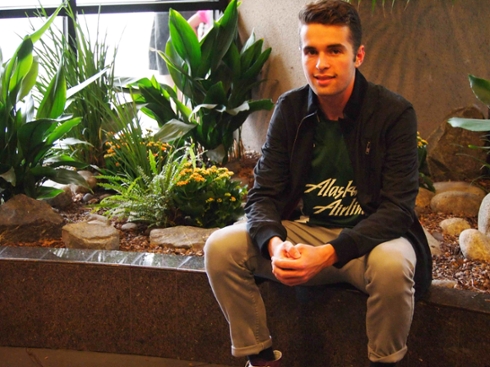
The experience I had with the Redden & Findling externship was a wonderful one. The people I met over the course of the week were phenomenal, being professionally informative as well as welcoming. I am completely satisfied with the knowledge I gained and I am grateful to the Redden & Findling firm as well as The Center for Life Beyond Reed for providing me with this opportunity.
The externship at the law offices of Redden & Findling seemed to be slightly different than the other externships offered, since it gave a firsthand look into the professional lives of a high-paced law office in East Portland. Traditionally, it’s quite difficult to find opportunities in the area of law as an undergraduate student because of the large pool of graduate law students around the country who are also competing for internships and employment. This externship is a rare experience and it should absolutely be taken advantage of if it continues to be offered.
The highly specialized nature of practicing law generally excludes most untrained students from participating, but Mike Redden found a great balance between observation and engagement that kept me interested for the duration of the week. Rather than have me do office work or simply sit and watch, he narrated almost all of his tasks to me so that I would have some idea of what was going on. All of this insider knowledge about the workings of law firms, estate planning and the ins-and-outs of the law code, combined with fanciful stories of the old days at Reed College, national bridge tournaments, and travelling across Europe made the week energetic and exciting. Unfortunately for Mike, he broke his femur weeks before and was confined to his home office, but it was better than ever for me – delicious lunches made by his wife and the company of two loving dogs by my side was more than I could ask for! His hospitality, willingness to answer all questions, and general light-heartedness showed me a side of law that I’d never seen before.
Continue reading Reed Winter Externship Reflections 14: Number Nineteen, Redden and Findling LLC, Luke Hackenberg
Reed Winter Externship Reflections 14: Number Eighteen, Our House of Portland, Florence Randari
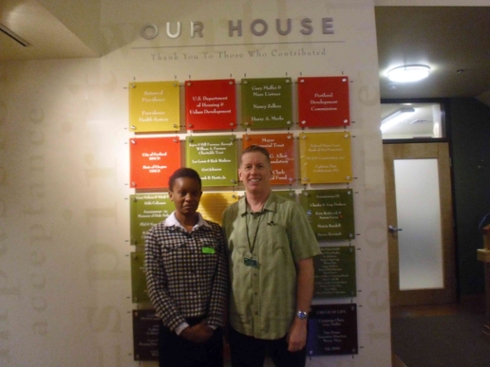
My name is Florence Randari, an international freshman student from Kenya. I am a prospective Math Economics major planning to join Business School after Reed and start a career in the financial services field. Through the help of my career adviser, Brooke Hunter, I managed to get a winter externship with a non-profit organization called Our House of Portland, to learn more about running and managing of non-profits.
Our House of Portland is a non-profit organization that provides healthcare, housing and other vital services to low income people living with HIV/AIDS. My host was Allen Brady who is the Director of Business services in the organization. Allen took me through a detailed information session on how he manages the finances of the organization, writes a budget and prepares an Annual Financial Statement for the organization among other duties. Being a non-profit, I was interested in knowing how they get the large amounts of money to offer free services to the 14 clients in the Neighbourhood Housing and care program as well as provide food banks, clothing and household items to over 700 people living with HIV/AIDS.

Continue reading Reed Winter Externship Reflections 14: Number Eighteen, Our House of Portland, Florence Randari
Reed Winter Externship Reflections 14: Number Seventeen, Multnomah County Library and Forbes Library, Rebecca Garry
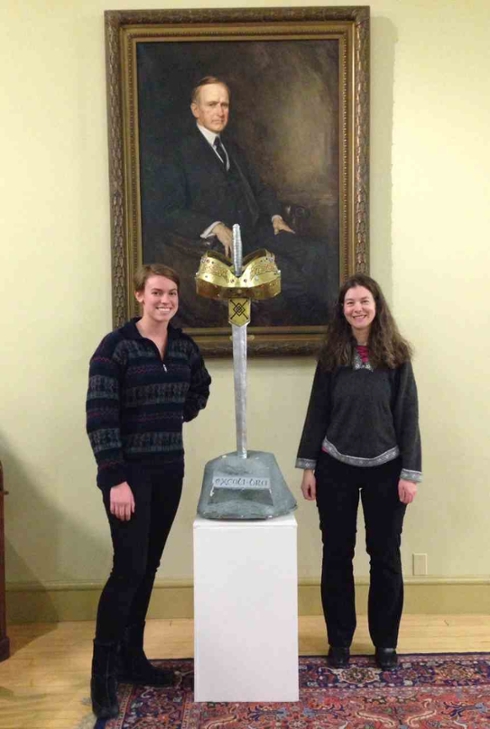
For my externships, I worked for a couple of days with the Multnomah County Library early childhood outreach services. I also went to Northampton, Massachusetts for a week and worked at Forbes Library. I went into the experience wanting to learn about what day-to-day work was like for librarians; I didn't have very high expectations, I just wanted to see what I would learn when I was there. I didn't even really think that I wanted to pursue the library world very strongly before my externship. I was totally blown away! I learned so much, and had a wonderful time. I am completely considering getting an MLS now.
The best part of my experience was working in the archives at the Forbes Library, which housed not only the local history archives for Northampton, MA, but also the collection of the Calvin Coolidge Presidential Museum. I felt completely at home in the archives, and like I could have spent days and months on end just exploring.
When I first started working in the Calvin Coolidge archives, the archivist Dylan told me that NBC had called the day prior and asked for a recording of Calvin Coolidge's first State of the Union address (the first State of the Union that was on the radio). He had looked around for it a little, but didn't think that it even existed, and told the reporter it wasn't in the archives. A few days later, a former archivist called and said she knew the recording was around...she said "it is in a cassette tape, in a drawer." This collection wasn't organized in a particularly accessible fashion; it was basically a room full of large cabinets and boxes with all sorts of different things in them. So when Dylan told me to go look for the recording, he didn't have very much hope, but he thought it would be fun for me to at least familiarize myself with all of the material. After sorting through for a while, I found a very old shellac 78 with the speech on it. Dylan came back and told me that we couldn't really send that to NBC, and after looking for a little while longer, we found a CD someone had transferred the speech to. Success!
Continue reading Reed Winter Externship Reflections 14: Number Seventeen, Multnomah County Library and Forbes Library, Rebecca Garry
Reed Winter Externship Reflections 14: Number sixteen, Minnesota House of Representatives, Paul Messick
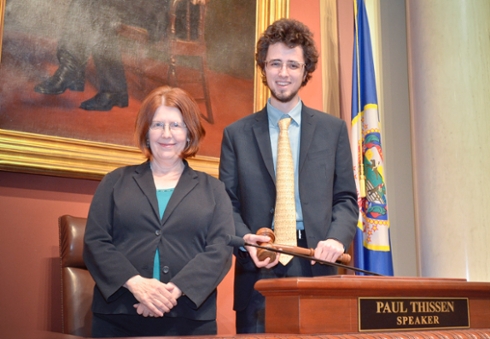
State government doesn't get much love from pop culture. There's glamour in Washington D.C., (House of Cards, The West Wing) and there's down-home folksy know how at the municipal level (Parks and Recreation), but state government is a black hole where entertainment magnates dare not tread. Over the course of my externship working along side a state legislator, I learned that state government (or at least my state government at home in Minnesota) is more deserving of a long-running Emmy award-winning television series than federal or municipal government. While municipal budgets are collapsing and Washington is gridlocked, state governments are, due to a number of factors, quietly wielding more and more influence over the way federal policies are implemented and designed. Moreover, with Washington caught in its own headlock, states are being tasked with solving big problems on their own. I interned with Tina Liebling — my local House representative, and mother of Sam Liebow, '14. Rep. Liebling is the chair of the Health and Human Services committee in the Minnesota House of Representatives. For a week, I watched as Liebling and her staff geared up for an extremely short legislative session -- in the words of my Governor, Mark Dayton, an "un-session." The short length of this “un-session" is meant to force Democrats and Republicans to get their grievances worked out before their bills hit the floor. During my externship, Liebling and her staff were setting her committee's schedule for the upcoming session. This meant meetings with lobbyists, constituents, and other legislators. I had the opportunity to sit-in on some of these meetings, mostly those between Rep. Liebling and a lobbyist or lobbyists. As someone who had never met a lobbyist before, listening and watching them work was quite interesting. A few of the lobbyists I met seemed like very highly-paid, extremely-biased research assistants. These lobbyists laid out a problem, a solution and, frequently, gave Rep. Liebling a bill to sponsor. Other lobbyists seemed like professional hand-holders, navigating their clients through the political process, and keeping them on message. The importance of lobbyists became clear to me over the course of the externship. It is simply impossible for a legislator to have an encyclopedic understanding of every topic they will encounter from medical licensing disputes, to volatile organic compounds. Lobbyists pass on information in thirty minutes that would take a legislator a week to research, allowing the legislator to craft a more informed opinion on the subject. The trick, I think, is to separate the facts from the spin. The better the lobbyist, the more difficult making that distinction becomes. I found myself trying to disentangle truth and “industry opinion” quite a lot over the course of the externship. I was tasked with researching and writing a report on the long-term care insurance market during my externship. The cost of long-term care is spiraling out of control. Minnesota’s “Medical Assistance” program (our version of Medicaid) could be spending $5 billion on long-term care in 2035 — which could bankrupt Medical Assistance entirely. Every stakeholder has a different solution to this problem, from massive tax incentives to entice people to purchase long-term care insurance, to mandating every man, woman, and child to carry long-term care insurance. If you want to read more about the advantages and disadvantages of currently proposed solutions and the long-term care insurance market, you can access my report here:
https://app.box.com/s/aooz4jur2fczp7nl0adg
Continue reading Reed Winter Externship Reflections 14: Number sixteen, Minnesota House of Representatives, Paul Messick
Reed Winter Externship Reflections 14: Number Sixteen, Method, Isabella Jorissen

David Lipkin, Reed class of 1991, is one of the co-founders of Method, an experience design firm, which was founded in 1999. Method currently has offices in San Francisco, London, and NYC. I spent two weeks at Method as an extern in the NYC office. While at Reed, David majored in history and also focused on anthropology. Currently, he manages the strategy and business development of the NYC office, though he also maintains an active role in many of the projects.
Despite all of the projects, clients, initiatives, and goals that Method juggles, it doesn’t come off as a stressful place to work. Their fifth floor space is open and well lit; nobody has an office. There’s a basketball hoop mounted on one of the walls, and I quickly learned that late afternoon breaks to play games of dice were commonplace. Everyone was friendly, and interacted with each other as peers. Until I spent time at Method, I didn’t fully appreciate how valuable a relaxed and comfortable atmosphere is to facilitating creativity in the workplace.
With that said, I confess that when I arrived at 9:30 on the first day, I was apprehensive. I wasn’t sure what I was going to be doing for two weeks. I felt like I didn’t have any design skills to speak of, and my front-end development skills definitely didn’t seem up to par. But everyone welcomed me and it was fine, I suppose. One of the best parts about my experience at Method was that there was so much going on- and so much that I could do- that I had to let go of the uncomfortable feeling that I was an intruder very quickly. After the morning standup, I was invited to observe one of the project meetings. I stood in the corner of the area watching when the project lead turned to me and said, “Feel free to jump in with any ideas or questions you have.”
Reed Winter Externship Reflections 14: Number Fifteen, Center for Cognitive Research, Kavya Basu

Over winter break, I was an extern at the Center for Cognitive Neuroscience under Dr. Sharon Thompson-Schill at University of Pennsylvania. My co-extern and I spent our days at Sharon’s lab talking to her and other researchers about their research.
One of the topics that Sharon is interested in is cognitive control. This refers to the executive control of the prefrontal cortex on cognitive processes such as rational thought, task flexibility, and working memory. Interestingly, when the human brain is developing, the prefrontal cortex grows much slower than the rest of it—as a result children exhibit the traits of someone with a damaged prefrontal cortex for many years. This quality has inspired much research into ways to accelerate the prefrontal growth of children, to make them “mature” faster.
However, Sharon points out that there are some important tasks that children are better at than adults, like learning and creativity. Their prefrontal immaturity may actually aid in these tasks and the cognitive control that adults have inhibits them. I observed a tDCS experiment in the lab that either increased or decreased prefrontal activity in participants while they performed tasks that require learning and attention to see if their performance was affected by the changes in prefrontal activity. The idea was that participants with decreased prefrontal activity were more like children and would do better on the tasks without the control of the prefrontal cortex in action. Therefore, it may be inadvisable to hasten the prefrontal growth of children without fully understanding the benefits of slower growth. Perhaps it is most efficient for children to have underdeveloped prefrontal cortices to learn more fully and to develop flexible learning and rational thinking later as adults.
Continue reading Reed Winter Externship Reflections 14: Number Fifteen, Center for Cognitive Research, Kavya Basu
Reed Winter Externship Reflections 14: Number Fourteen, Hunter College Lab, Rachel Otto
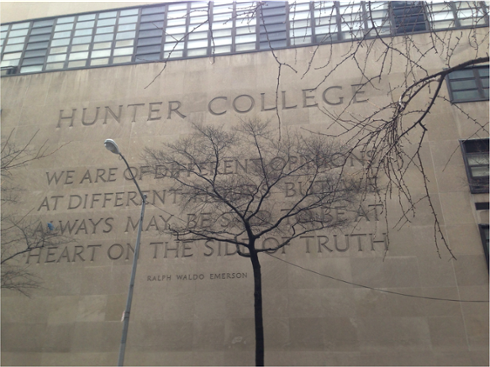
This winter break I had the pleasure of visiting Sam Groveman, an alumnus who is currently getting his doctorate in radiochemistry at Hunter College in New York City.
The radiochemistry program that Sam has been tirelessly campaigning is in its first few years of operation, and Sam is hoping that more Reedies will become interested in applying. The program lies at the intersection of two pre-existing groups, the City University of New York system (CUNY) and the NSF funded Integrative Graduate Education and Research Traineeship program (IGERT). This allows for extensive collaboration with other groups within the CUNY and IGERT systems, including several prominent universities around the country, as well as national laboratories such as Oak Ridge and the prestigious Memorial Sloan Ketterin Cancer Center.
To get involved with the program one has to apply to the graduate center for CUNY, and get accepted into the chemistry program. The first two years of the program are spent taking graduate classes and rotating through various labs in the CUNY system. One of those years will be spent at Hunter, if the participant knows he or she wants to be in IGERT. For the first two labs, the participant receives a stipend. Then the last three years are spent doing research and dissertation work.
Continue reading Reed Winter Externship Reflections 14: Number Fourteen, Hunter College Lab, Rachel Otto
Reed Winter Externship Reflections 14: Number Thirteen, Gresham Animal Hospital, Shannon Bacheller
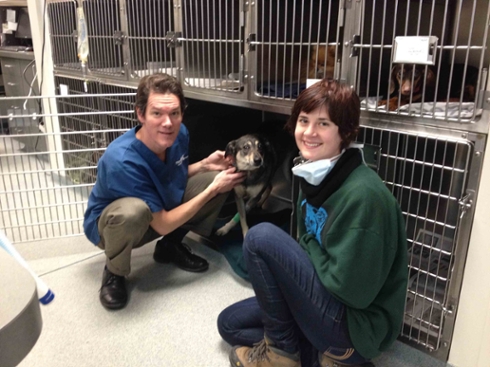
I’ve loved animals ever since I was a little girl. Bugs, lizards, squirrels, frogs- you name it. And of course, when asked what I wanted to be when I grew up, I always replied that I wanted to be a veterinarian. After all, what job could be better than one where you got to play with animals all day and make them feel better? Once I turned thirteen, I left this childhood dream behind for more realistic pursuits. Like becoming a physicist (hahaha). I couldn’t dissociate being a vet from my childish (and therefore naïve) fantasy of it. It took me a while before I started listening to that little girl again, but this time I was determined to base my decision about what to study and do with my life on something more substantial than “really liking animals”. This is where Dr. Chris (a Reed graduate!) at the Gresham Animal Hospital came into play.
Continue reading Reed Winter Externship Reflections 14: Number Thirteen, Gresham Animal Hospital, Shannon Bacheller
Reed Winter Externship Reflections 14: Number Twelve, Creative Sciences School, Meredith Horel
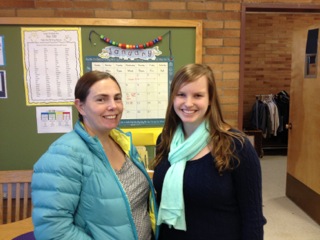
I participated in an externship with Moira Tofanelli. Moira is a School Psychologist at Creative Sciences School in Portland. She was very accommodating and tailored the experience to my interests. I learned that a School Psychologist spends their time focusing on the kids who are not doing very well in school, either academically or behaviorally, and try to determine if they need special educations services. I was intrigued that this was not an exact science; there are many circumstances making it it unclear what is causing the issues for the child and what steps should be taken to help correct the problem. This was highlighted for me when I did a case study of a sixth grader who was undergoing an evaluation to determine eligibility for special education services. Overall, my externship was a very rewarding and interesting experience.
Continue reading Reed Winter Externship Reflections 14: Number Twelve, Creative Sciences School, Meredith Horel
Reed Winter Externship Reflections 14: Number 10 Crossroads Community Services, Emma Handte
Although my externship at Crossroads Community Services was short, just four days, it was an extremely enriching experience. I saw the organization both from an administrative perspective by attending meetings, seeing how food for the soup kitchen, shelter, and pantry is acquired and organized, and how guests at the shelter are selected. I also took a volunteer's perspective, by participating in helping the shelter, soup kitchen, and pantry programs. Additionally, I was able to learn from my externship sponsor about the ins and outs of the shelter system in New York. I became aware of the factors that can lead to homelessness, and about some of the potential solutions.
Crossroads Community Services consists of three different programs. The women's shelter gives up to ten women dinner and a warm place to sleep every single night. The food pantry acts somewhat like a grocery store with free items for families having trouble making ends meet. Their soup kitchen serves dinner to homeless individuals every night and serves a full, restaurant style breakfast on Mondays, Wednesdays, and Sundays. Additionally, the soup kitchen hands out coats and other donated goods before dinner some days. The three programs complement each other well, each providing vital resources to individuals in different situations of need. The three programs are able to support each other, because one often is able to make use of leftover or unused resources from another of the programs.
My first experience was with the soup kitchen, working with other volunteers to go on what are called "food rescue missions”. These “missions” consist of picking up the day's unsold, leftover foods from stores and company cafeterias (CCS is in midtown. I had no idea that businesses were a source of food for soup kitchens, and found it really interesting and inspiring that for-profit companies were willing to be so generous. Also, the food we were able to scrounge up was really tasty! The guests who come to the soup kitchen for dinner every night really seemed to appreciate it.
